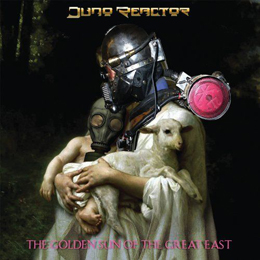
When I first listened to this album at the occasion of downloading it to my mp3-player, I could not help myself from thinking how great this band would've done in the British Goa Trance scene of the mid-'90s. Little did I know that I was to find out that the band in fact had a leading role in the genre! And damn me for not knowing the band better, because it grew to global repute thanks to composing the musical score for the movie The Matrix!
(info entailed in the following taken and re-written from the act's page on Wikipedia) At the core of the project is one Ben Watkins, whom started Juno Reactor as and art project in 1990, and went on to collaborate with other artists from around the world (since 2009 drummer Budgie of Siouxie And The Banshees is inducted in the live band!, the rest of the current line-up including Japanese guitarist Sugizo, Israeli dancer/ percussionist Mali Mazal, Indian singer Hamsika Iyer, Spanish guitarist Amir Haddad, and Greek percussionist Kostas Kostaskopanaris) to produce music (a cinematic fusion of electronic, global influences, with orchestral approach) that was not commercially driven. A first single, followed by debut full-length Transmissions, was released in 1993 on the NovaMute label, becoming the first in its genre! 1994's Luciana (originally a 61-minute track composed for The Missile Project traveling art installation) was then released through Inter-Modo (a label started by Alex Patterson of the Orb). Next up, Juno Reactor signed to Blue Room Released, through which the 1995 and 1997 albums Beyond The Infinite and Bible Of Dreams were issued (the latter moving away from the traditional dance beats of the earlier recordings by employing tribal influences (single “Conga Fury” included a collaboration with African percussion act Amampondo, and later Watkins would take the act along on a US tour, which saw Juno Reactor opening for Moby). Juno Reactor's first album through Metropolis, 2000's Shango, would find Watson collaborating with guitarist Steve Stevens (of Billy Idol) for the first time (they would again collaborate on 2002 single “Hotaka”), on the album's first track “Pistolero” (featured in the trailer and soundtrack for the movie Once Upon A Time In Mexico). In 2003, the compilation album Odyssey 1992-2002 commemorated the project's 10 years of existence, displaying the best JR songs to date.
Released in October 2004, JR's 6th album Labyrinth included Watson's work for the Matrix movies. In between the latter and the following JR album (2008's Gods & Monsters), Watson worked on a couple of other projects. Firstly, he was hired to compose an orchestral score for Japanese anime feature film Brave Story. Credited as written by “Ben Watson aka Juo Reactor”, the soundtrack was recorded at the Slovak Radio Concert Hall with the Slovak National Symphony Orchestra, and released through Sony Japan in 2006. Following that little adventure, Watson collaborated with anime director Koji Morimoto for Genius Party Beyond, an anthology of short animated films from Studio 4°C. Over the years, music by Juno Reactor (occasionally remixed) has been featured in other television series and movies as mentioned [these including Texhnolyze (television), and Eraser, Virtuosity, Lost In Space and Beowulf (movies)] and been played during baseball, basketball and gridiron football games, as well as the Japanese Grand Prix! Music by JR has also been featured in several video games...making JR a commercially viable entity in spite of Watson's original ideas about the project. Hahah...little joke there! Oh...and besides the full-length studio albums, there's also been live albums : 2002's Shango Tour 2001 Tokyo (Live In Tokyo) and 2007's Juno Reactor Live – Audio Visual Experience.
Getting back to the album at hand, you'll find album opener “Invisible” and the track “Shine” having Indian influences, first with the inclusion of sitar-like guitar and tabla being played, and secondly through the use of singers (in the first case a male and female singing actual lyrics, in the second a female chanting with no actual lyrics. Second track “Final Frontier” (with a 10-minute length the longest track on the album), with its “older” sounding tonality, could've come from a Tangerine Dream album, but doés include very nice (electric) guitar play. For the ensuing “Guillotine” a more Dance-geared sound is used, but watch out for the surprisingly “heavy” guitar being played in the second half of the track! For “Trans Siberian” a more symphonic style is employed, an a soprano and male singer (I'm uncertain to call him a tenor, or what-will-you-have) getting further “vocal” backing by synths emulation a female choir. Letting aside the tracks “Tempest” and “To Byculla” as repetitions of one of the previous modes (but therefore certainly nót calling 'em lesser tracks...not by any means!) the album's closing tracks show a different approach, constituting Watson's well-executed attempts at incorporating an element of horror in his tracks (“Zombie” including a sample from some '50s or '60s B-movie).
Ach...greéééat stuff, this...and I have been quite reluctant to start the review, because having reviewed an album means moving on to the next job! Luckily, I'm off on a week's vacation in a couple of days and, leaving the album on the mp3-player, I'm certain to get a couple more listening sessions yet! For an introduction to the complete current album, log onto (www.) junoreactor.com, and go to the “New Album” section! I guess I'll be looking for other albums from this project at the local record store once I get back from that short vacation!!!
